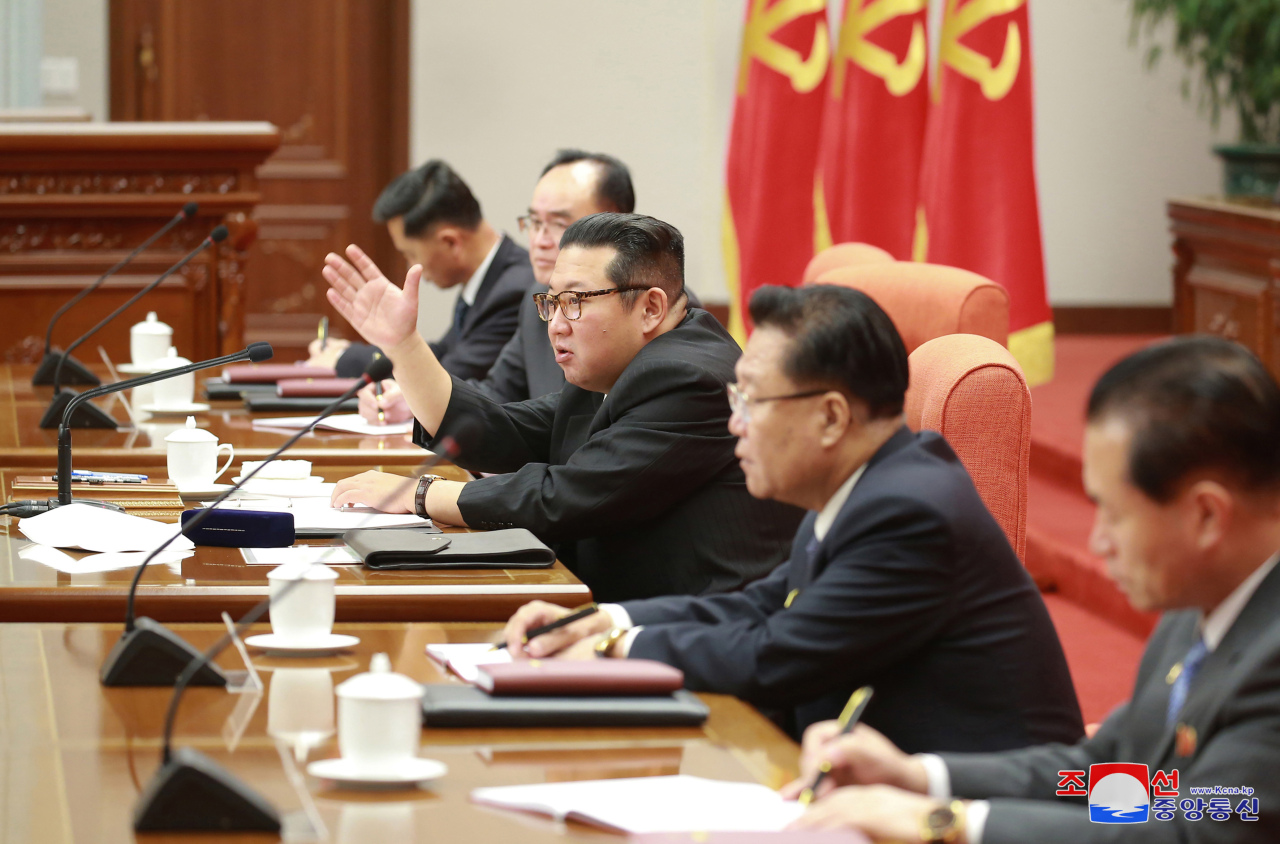North Korea on Monday kicked off a key party meeting to discuss and decide major “strategic and tactical policies” for the next year, with the attendance of the country’s leader Kim Jong-un.
The North Korean leader presided over the fourth plenary meeting of the eighth Central Committee of the Workers’ Party of Korea upon the authorization of the politburo, North Korean media reported Tuesday.
The meeting has been held in public four times this year mainly with an emphasis on domestic issues, including the implementation of a five-year economic plan, nationwide ideological campaigns and preventive measures against the COVID-19 pandemic.
The plenary meeting has added significance given that Kim has announced the country’s “new strategic line,” such as the Byungjin policy, reflecting changes in internal and external environments.
In general, Pyongyang examines progress in implementing political and socioeconomic policies and discusses weighty internal and external issues and party personnel shuffles, while using the plenary session for major decisions.
The North Korean state media on Tuesday said participants would “review the implementation of main Party and state policies for the year 2021” at the fourth plenary meeting.
The meeting also aims to “discuss and decide on the strategic and tactical policies and practical tasks for dynamically guiding the struggle of our Party and people to usher in a new period of the development of socialist construction to the next stage of victory,“ the media added.
In particular, the year-end plenary session is crucial in light of the track record of Kim in utilizing a major party meeting as the platform to announce his domestic and foreign policy road map and plans for the new year. The North Korean leader has not delivered a New Year‘s speech since 2019.
This year, Kim expects to present his recalibrated approach to South Korea and the US amid both sides continuing to send overtures for dialogue.
South Korea’s Unification Ministry on Tuesday once again urged Pyongyang to “choose the path toward restoring dialogue and cooperation between the two Koreas and the US.”
All eyes are riveted on the meeting as it comes at a critical juncture. This marks the 10th year of Kim assuming the “supreme commandership of the Korean People’s Army” on Dec. 30, 2011.
Against this backdrop, Pyongyang expects to present a positive assessment of economic achievements at a plenary meeting, which was also held in the first year of implementing the five-year plan proposed during January’s party congress. The North Korean state media has continued to praise this year as a victory.
South Korea’s Unification Ministry on Tuesday pointed out North Korea would “have to continue its impetus for the five-year national economic plan by at least setting a higher goal in each field,” taking note of the importance of the next year.
Next year marks the beginning of a new decade of Kim Jong-un’s rule, the 110th anniversary of the birth of his grandfather, the late founder Kim Il-sung, and the 80th anniversary of his father and previous leader Kim Jong-il’s birth.
The Unification Ministry also assessed that around 1,000 personnel attended the plenary meeting. The number of participants is analogous to the plenary session held in December 2019, in which Kim Jong-un first delivered year-end remarks in lieu of a New Year’s speech.
Photos provided by North Korea’s state-run Korean Central News Agency showed members of the Presidium of the Political Bureau of the Party Central Committee and members of the Political Bureau participating in the meeting along with members and alternate members of the Party Central Committee.
North Korea state media also reported that “officials of the departments of the Party Central Committee, leading officials of ministries, national institutions, province-level guidance organs, cities, counties, and major industrial establishments and officials of relevant major sectors” attended the meeting as observers.
The Unification Ministry viewed that the attendance of officials of factories and industrial establishments was intended to garner on-the-ground opinions when evaluating this year’s performance and to utilize them as a medium to inform the party’s decisions and give instructions to workers on the site.
By Ji Da-gyum (
dagyumji@heraldcorp.com)








![[Today’s K-pop] Blackpink’s Jennie, Lisa invited to Coachella as solo acts](http://res.heraldm.com/phpwas/restmb_idxmake.php?idx=644&simg=/content/image/2024/11/21/20241121050099_0.jpg)